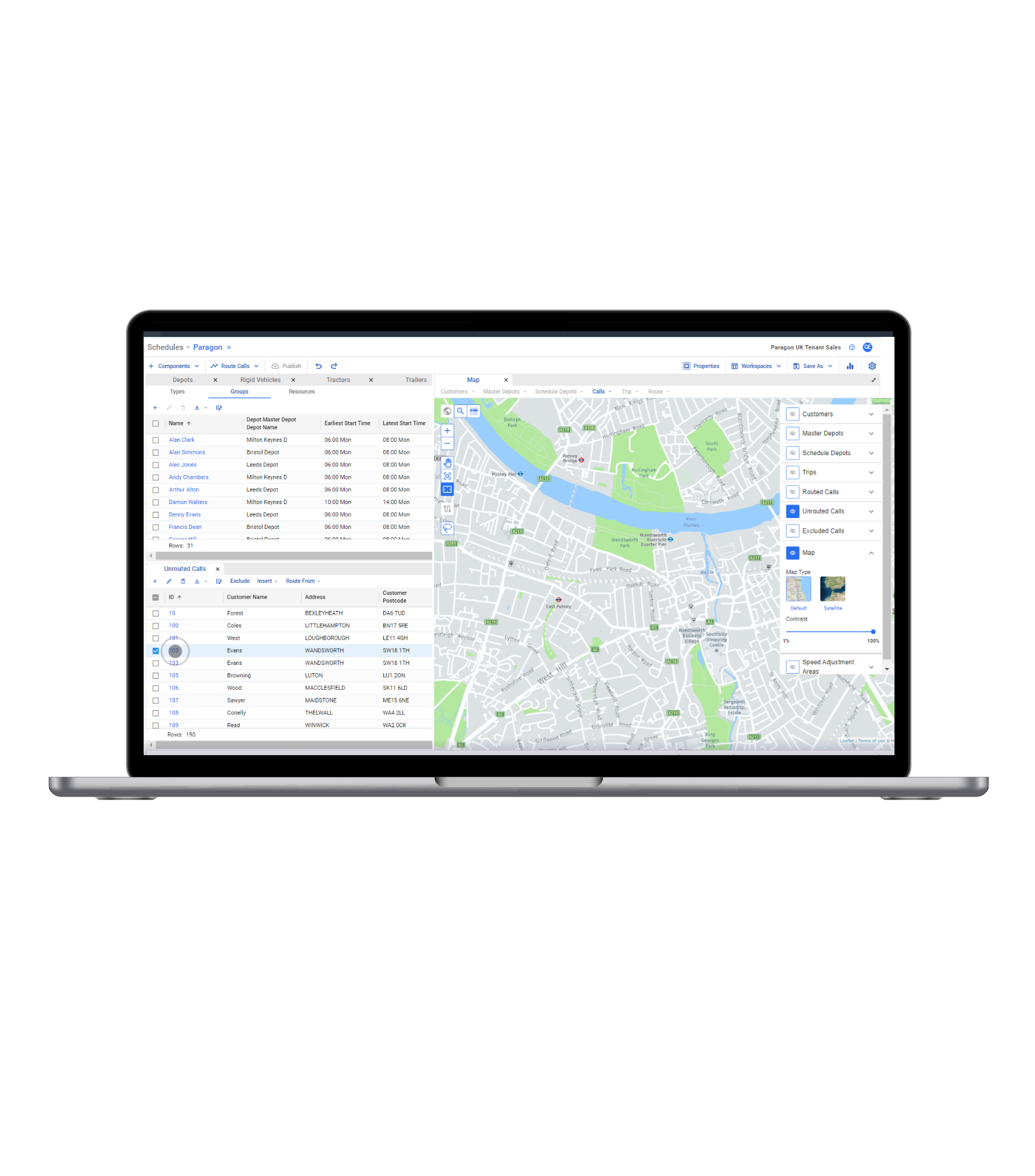Why You Should Invest in Delivery Routing Software Now
Why You Should Invest in Delivery Routing Software Now
Why You Should Invest in Delivery Routing Software Now
12 Feb 2021
 Aptean Staff Writer
Aptean Staff Writer 
Delivery routing software is more necessary than ever before. And it’s only going to become more useful, more valuable and more essential as time progresses.
The Covid-19 pandemic has been a game-changer in many ways—you know this as well as we do. It has also highlighted and accelerated many trends already in play, including ones that put delivery efficiency and excellence at the forefront in the fight to stay competitive.
Superior delivery routing is not just about miles, time and money saved—it’s about market share gains. It’s an investment in your future. Now is the time to capitalize on advanced tools and technology to make your delivery operation the competitive advantage it needs to be.
We want to help you navigate the challenges in delivery routing. And to help you better understand the WHY. Why should you invest in advanced delivery routing software? Why should you do it now?
Well, here’s why.
You Can Quickly Adapt Delivery Operations Amid Unexpected Changes.
The last year has seen well-equipped distribution businesses exploit the ability to switch quickly from wholesale to retail deliveries and vice versa, or seamlessly incorporate new safety protocols and respond dynamically and effectively to pandemic-driven changes.
Some operations have significantly contracted during the lockdown period, while others have had to ramp up.
Agility will be critical to competing in whatever is the “new normal.”
Advanced delivery routing software offers supreme agility in the face of delivery changes. Let’s say a food distributor’s restaurant business has dried up, but its hospital and school delivery business has doubled. The right technology enables you to reconfigure routes in minutes and determine the most efficient use of available resources. In a manual route planning environment, transportation planners could take days to arrive at a less optimal solution.
It seems increasingly likely that rapid change is here to stay and that dynamic route planning with advanced route optimization software will be a critical capability as we go forward.
While remote working may not apply to your dispatch, drivers and warehouse workers, it certainly won’t hurt to have a centralized delivery routing system in place. It can be accessed and operated remotely by workers from anywhere with a SaaS, cloud-based routing software platform.
You Can Meet High, Amazon-Fueled Expectations for Precise Delivery Performance.
Amazonization. Yes, it’s a clumsy term, but it reflects a permanent shift in customer expectations about fast and cheap (preferably free) delivery—both in B2C and B2B.
Again and again, businesses tell us: “We have gone from offering delivery five days per week to seven days per week in our largest market due to customer demand.” We’re also seeing increasing demands for much narrower delivery time windows, meaning delivery schedules need to be more precise and thoroughly reliable.
More frequent, precisely timed deliveries tend to result in trucks that are less than full driving more miles—pushing costs upward. Advanced routing software uses smart algorithms to consider near-infinite numbers of routing possibilities to arrive at the most efficient, precise and achievable routing plan. It builds a feedback loop so that any issues or delays are incorporated into future plans, meaning delivery operations are in a state of continuous improvement.
Even better, additional features such as home delivery management and electronic proof of delivery capabilities offer ways to stay ahead of those increased end-customer expectations while saving money. You can include in the route plan actions such as removing packaging and old appliances when making two-man home deliveries. You can also create a more consumer-driven delivery operation by allowing consumers to choose and change delivery times themselves, online, while the system directs them to the delivery time choices that make schedules more efficient for you, continually optimizing them in real time.
You Can Maintain Profit Margins.
Every extra dollar spent on fleet operations is a dollar of profit lost. Distribution businesses are not, and won’t soon become, high-margin operations. When you rely on spreadsheets and other basic tools to decipher complex routing schemes, your fleet drives 10–30% more miles than needed, and each of those extra miles costs you $2.80 (National Private Truck Council’s estimated cost per truck mile).
So, if your 30-truck fleet drives 1.5 million miles a year, then a 20% efficiency gain would save $840,000per year, primarily from a reduction in trucks, drivers and fuel.
You Can Optimize the All-important Final Mile.
Last-mile delivery, and logistics in general, has historically been regarded as a cost to be managed, not a growth agent to be leveraged.
But things have changed. Now, it is recognized as one of the top competitive differentiators. In the B2C world, a MetaPack survey of global consumers on ecommerce delivery found that 66% had bought goods from one retailer over another because of more appealing delivery options. By removing the guesswork from route planning and scheduling, delivery routing software helps get products to customers faster, more predictably, at a lower cost and with cutting-edge visibility.
Superior last-mile delivery performance leads to world-class customer service, superior customer retention and revenue growth. These outcomes are as crucial as truck-mile reduction and improved asset utilization when considering ROI on the software.
Because the last mile is the most complex part of the supply chain, it is commonly the last part to be optimized. It’s time to change that.
You Can Better Manage the Industry Truck Driver Shortage.
Truck drivers are in shorter and shorter supply, and even the best technology can’t help if there is no driver to get behind the wheel (not yet, anyway). Generous signing bonuses, benefits and paid leave can help. But nothing addresses the driver shortage more effectively than if you simply need fewer drivers to complete the same number of deliveries. That’s what happens when you optimize routes with delivery routing software.
You Can Be More Accountable to Internal Stakeholders.
Like it or not, delivery operations are no longer considered “just the shipping department” anymore—they’re a well-recognized and critical part of the overall business.
And that means accountability, all the way up to the boardroom. C-level executives are demanding more and more detailed reporting of delivery KPIs—not just costs but stats on planned vs. actual routes taken, on-time performance and customer satisfaction, too.
This type of increased accountability will become the norm. The ability to share accurate, daily reporting across the transportation operation means delivery fleet operations step up as a transparent, highly functional part of the business. Even better, you can demonstrate in plain figures all the ways you are achieving continuous improvements.
This works well in outward-facing interactions, too. For example, sales staff can cite on-time delivery performance in negotiations. Accounts payable has more accurate information to compare with invoices. Marketing can realistically plan promotions or seasonal surges around actual delivery capabilities.
Future-Proof Software Must Fit Your Business, Not the Other Way Around
Things in the global marketplace are changing, and they’re changing fast.
It’s critical that you choose a routing software solution to help you adapt and compete, not only today but into an uncertain future.
The route optimization software from Aptean can transform your business. Find out how, now.
Heb je de productrondleiding geprobeerd en ben je klaar om in de versnelling te komen?
Boek vandaag nog uw volledige demo met ons team om te zien hoe onze geavanceerde routeringssoftware u kan helpen de prestaties te versnellen.



